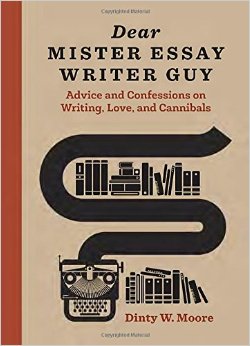Book review: Dear Mister Essay Writer Guy, by Dinty W. Moore
The back cover copy for Dear Mister Essay Writer Guy: Advice and Confessions on Writing, Love, and Cannibals promises that this book is a “unique writing guide” to creating personal essays. As someone who likes to write the odd personal essay, I was interested. I was also intrigued by the format: a series of questions asked by “top contemporary essayists” (including Cheryl Strayed and Roxane Gay) and answered by Dinty W. Moore, an actual person and essayist and not, as I had imagined, an animated can of beef stew.
I first opened Dear Mister Essay Writer Guy expecting, if not inspiration, then at least some solid ideas for kickstarting my next personal essay. But I got bogged down in the book’s preciousness and soon closed it again. What do I mean by “preciousness?” Well, the introduction is written in the second person (eesh) and includes this sentence: “You are a good-looking person whose minor flaws seem to only accentuate your considerable charm.” This winking tone continues throughout the book, much to my chagrin. For example, there is a question answered entirely in a series of cocktail napkin drawings. Some might find this adorable, but for me, the humor wasn’t strong enough to overcome the cutesiness. I’m afraid I’m just not the target audience for this kind of thing.
I reopened the book and tried to read it straight through. The first question, from essayist Phillip Lopate, is about how to write about ex-girlfriends without coming off as a “chauvinist pig.” Putting aside my own question about whether Lopate’s letter was sent via time portal from the mid-1990s, I found Moore’s response pat (“don’t be a chauvinist pig”) and the accompanying essay boring. Perhaps the problem here is that I am not familiar with Dinty W. Moore’s essay writing, and that to fully appreciate this book, one must be a fan of his work. I’m not sure. But I found myself skimming, and skimming some more, through the rest of the questions and answers.
Some of the questions struck me as so esoteric as to be useless (e.g., what is “the connection between Buddhism and writing?”), at least to my own writing, but others were somewhat more helpful. I enjoyed Moore’s response to Cheryl Strayed’s question about the distinction among the hyphen, the en dash, and the em dash. I also liked Moore’s “Four Essential Tips for Telling the Truth in Memoir and Securing That Blockbuster Book Deal,” in response to a question from Michael Martone about whether to use one or two spaces after a period. Incidentally, Moore never answers Martone’s question about spacing, but he does discuss the concept of telling the truth and fictionalizing in memoir.
I’m sure that fans of Moore’s work will find this volume entertaining and perhaps even inspiring. But for me, earnest seeker of writing advice, it fell flat.


Leave a Reply